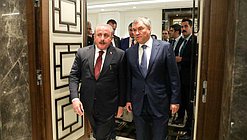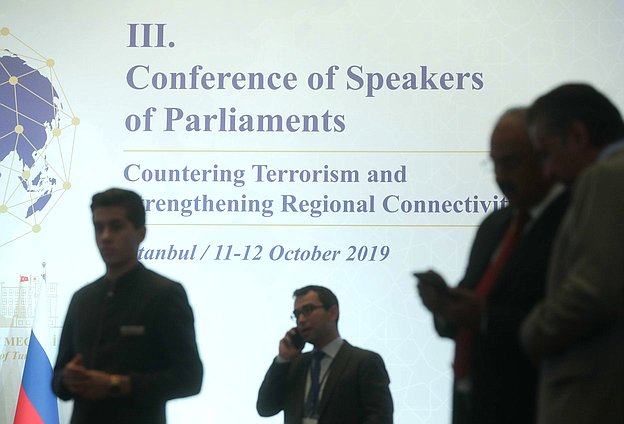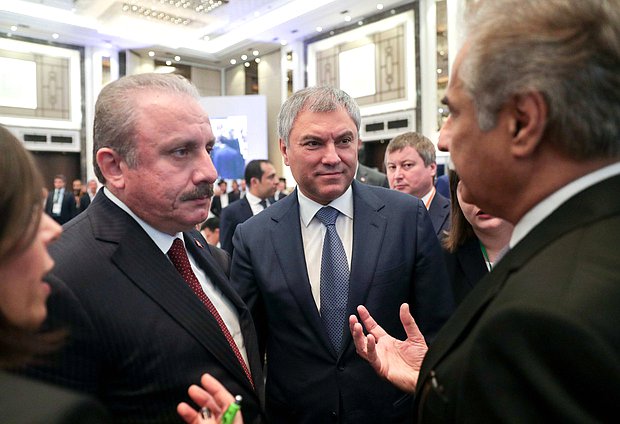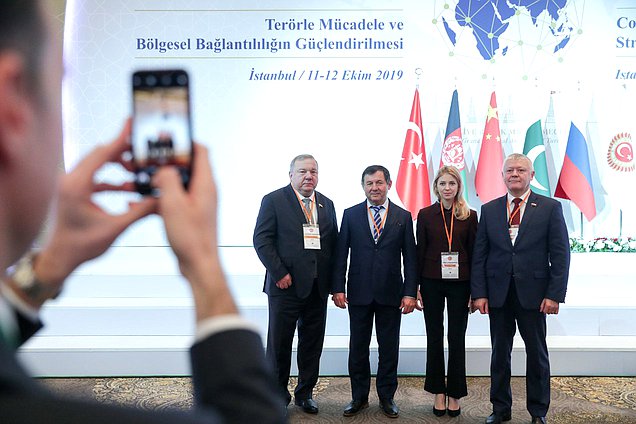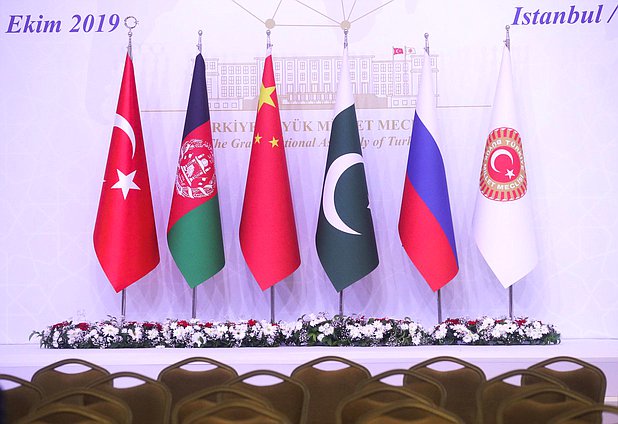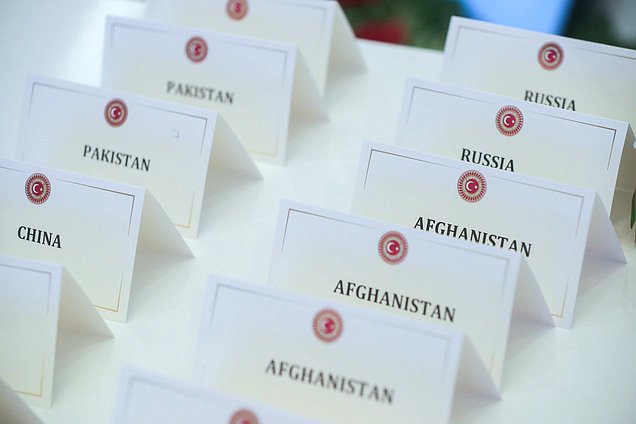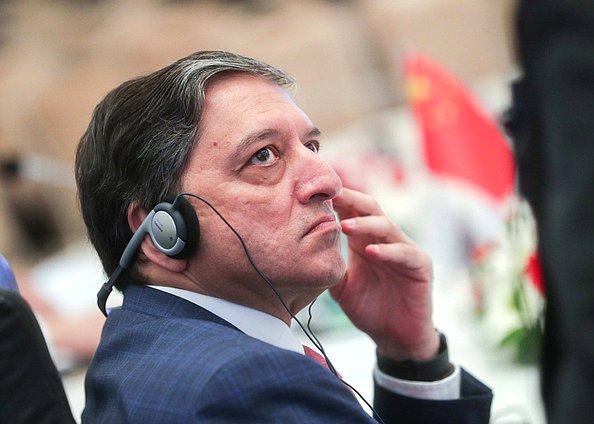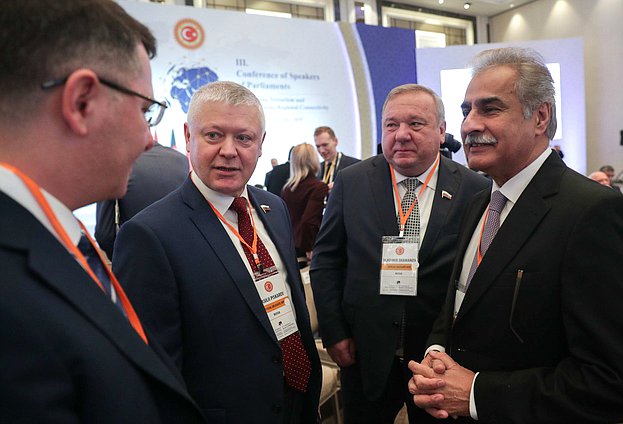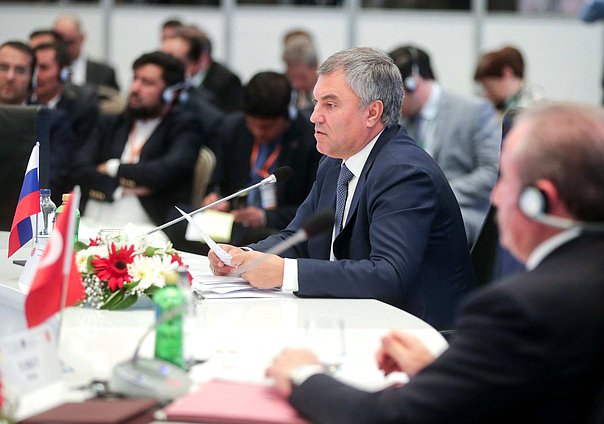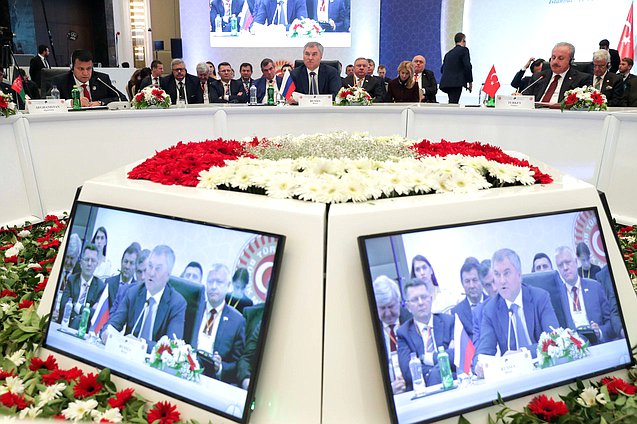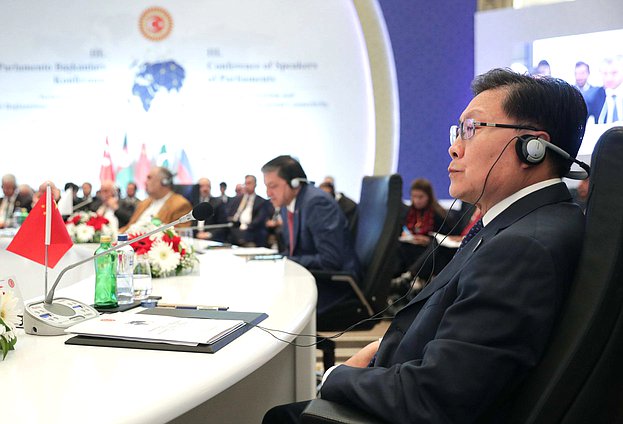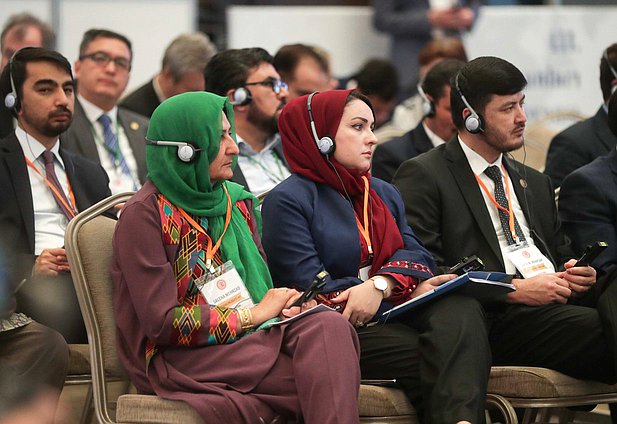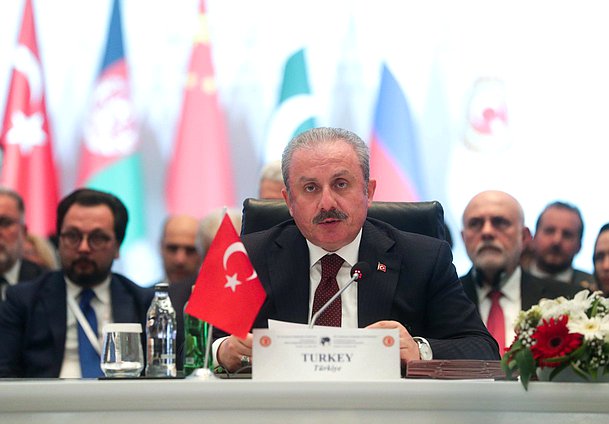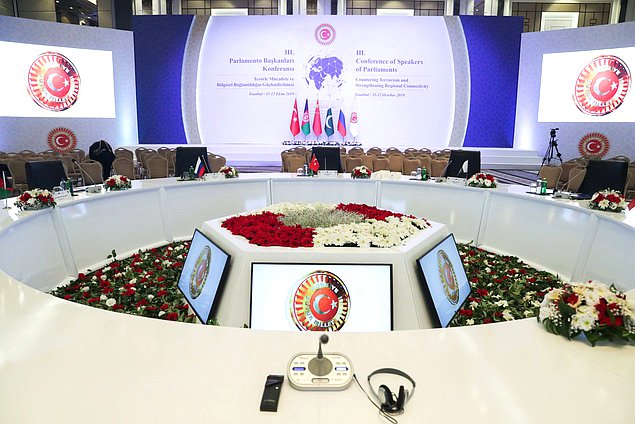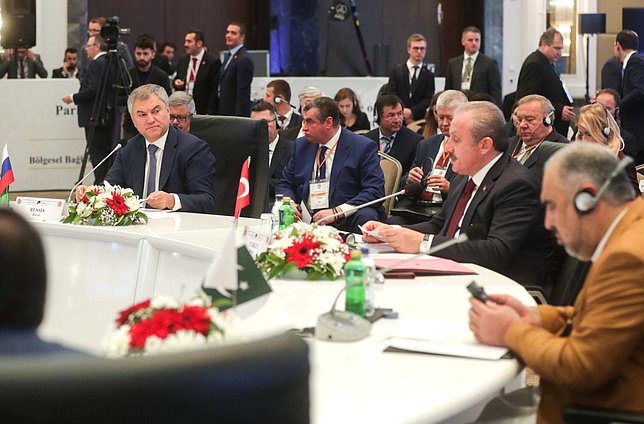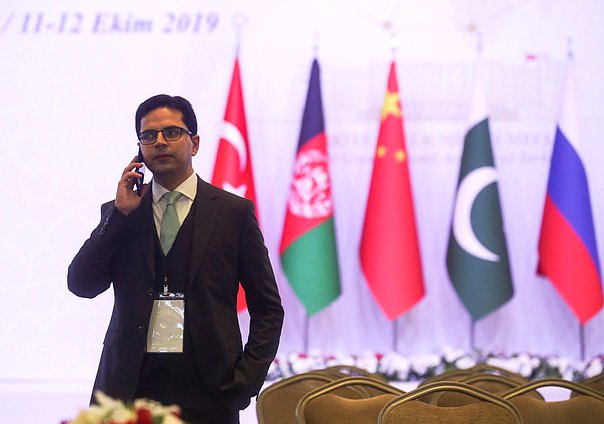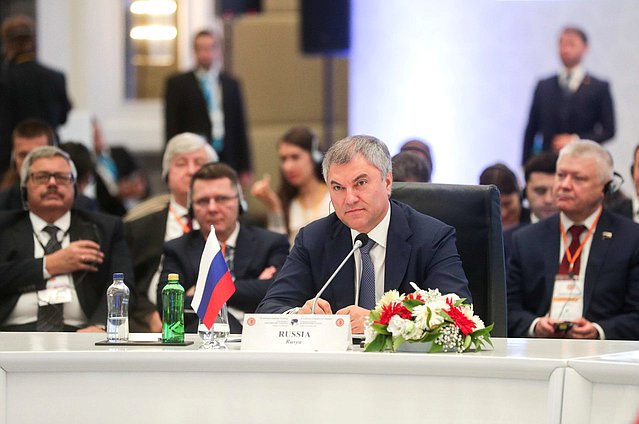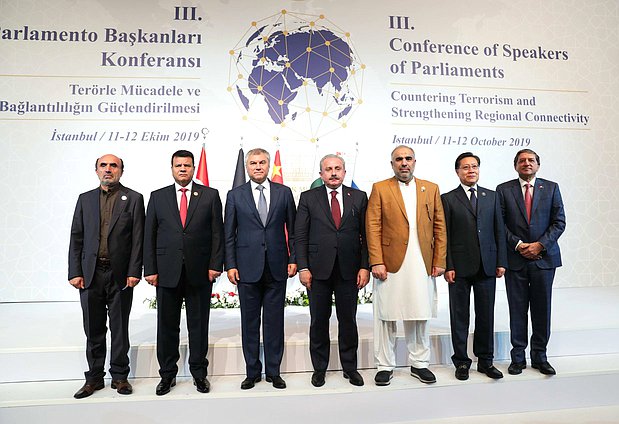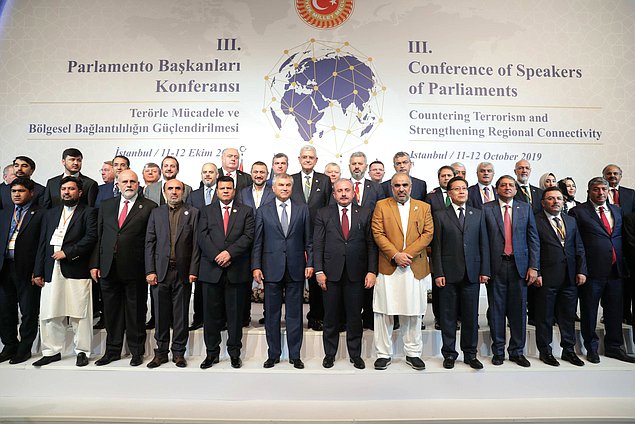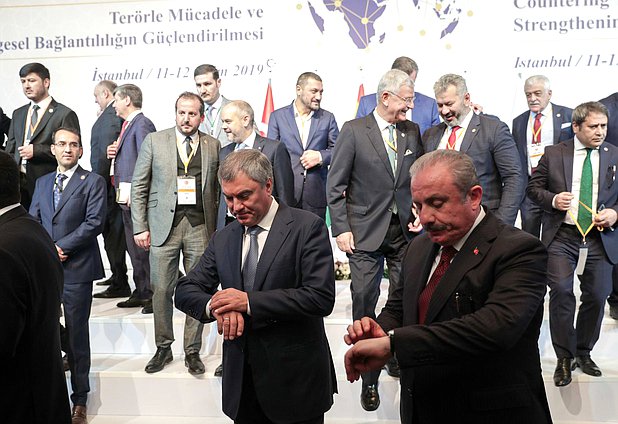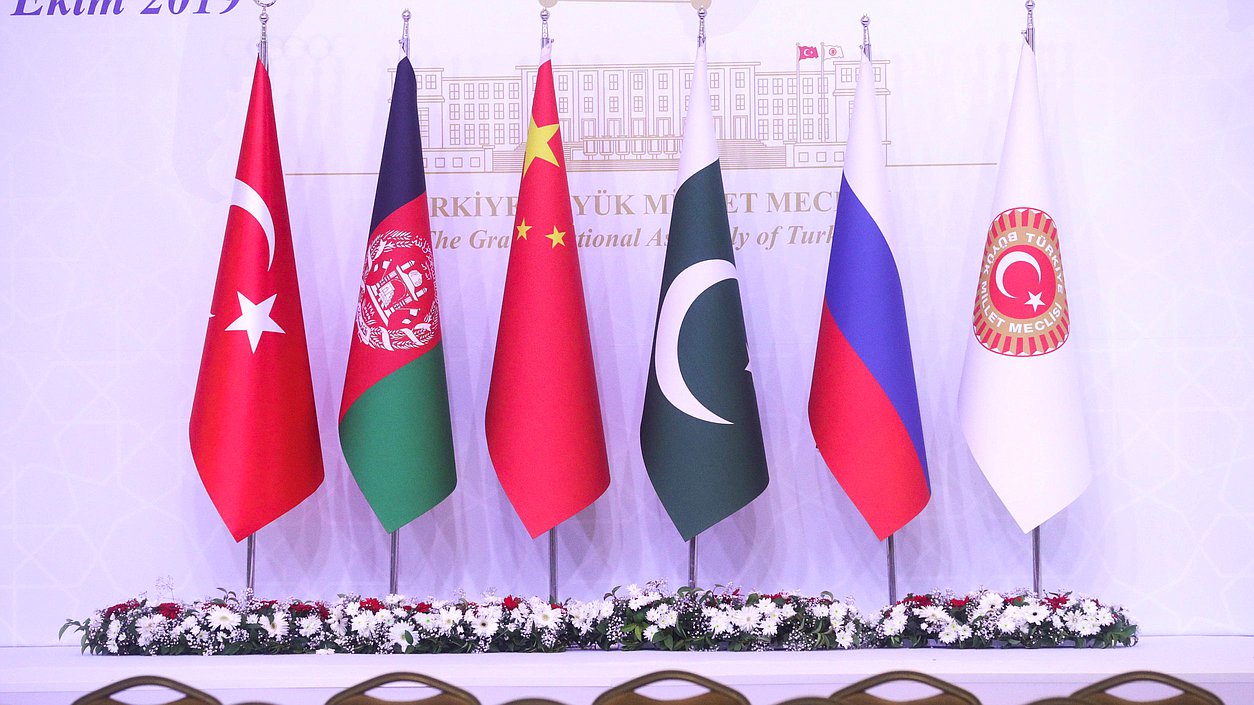
Considering the historical, cultural, social, economic and political ties between our states as well as the people-to-people interaction of our citizens that build up a strong foundation for deepening our relations and bilateral and multilateral cooperation;
Welcoming the efforts of our Parliaments to ensure cooperation on the basis of Islamabad Declaration of 24 December 2017 on 'Partnership for Peace, Development and Connectivity' and Tehran Declaration of 8 December 2018 on 'Synergy for Countering Terrorism and Consolidating Regional Cooperation' of the previously held Conferences of Speakers of Parliaments;
See also
Endorsing the Islamabad and Tehran Declarations of this Forum and the issues mentioned therein;
Guided by the system of international relations that based on the principles of equality, dialogue, cooperation, respect for international law, respect for the sovereignty of states and noninterference in their internal affairs;
Stressing that States and their competent bodies have the primary responsibility in preventing and countering terrorism and extremism at the national and international levels, and the need to promote international cooperation in accordance with the principles of international law, the Charter of the United Nations, relevant UN Security Council Resolutions as well as the UN Global Counter-Terrorism Strategy;
Being interested in further strengthening of inter-parliamentary relations to promote common interests and values in the international arena as well as to support the multi-dimensional cooperation of our governments as parliaments;
Deeply convinced that inter-parliamentary cooperation establishes dialogue channels that advance interstate relations, contributes to rapprochement between countries and plays an essential role in conflict prevention and resolution;
Stressing the commitment to deepen interaction between legislative authorities and exchange experience in order to further improve the quality of law-making and decision-making processes;
Emphasizing that terrorism in all its forms and manifestations constitutes one of the most serious threats to international peace and security and undermines the wellbeing, prosperity and stability of our peoples and our states;
Reaffirming that any acts of terrorism are criminal and unjustifiable regardless of their motivations, whenever, wherever and by whomsoever committed, and reiterating that terrorism should not be associated with any religion, nationality or civilization, and further stressing the inadmissibility of the use of terrorist and extremist groups to achieve political goals;
Recognizing the urgent need to build a sustained and comprehensive approach and a strategic framework, involving active participation and collaboration of all States and international and regional organizations to impede, impair, isolate, and incapacitate the terrorist threat;
Considering also that the financing of terrorism is a matter of grave concern to the international community as a whole;
Cognizant of the interlink between security, peace and development and that achieving lasting stability requires a motivated private sector, strong trade relations and investment-friendly environment as well as adequate and well-developed human capital;
Affirming the utmost importance of fostering economic relations and trade channels to strengthen regional connectivity;
Aware of the complexities of regional and global challenges and the importance of multilateralism in addressing those challenges but also of new opportunities which will shape the future of the Euro-Asian and Mediterranean area as well as the required enhanced capacity in addressing the challenges and profiting by the opportunities in the context of cooperation;
Highlighting the necessity of further interaction and dialogue among our parliaments, governments and nations;
Discussed the role of parliamentary diplomacy in addressing key issues of the regional and global developments and we agreed to
1. Reaffirm our commitment to the purposes and principles of the Charter of the United Nations in particular those concerning the maintenance of international peace and security;
2. Reaffirm also our adherence to the principles and norms of the international law, as well as the international obligations under the treaties and other international instruments to which our countries are party in order to strengthen cooperation;
3. Renew our commitment to strengthen inter-parliamentary relations and support establishing and accelerating the relations between committees, friendship groups and administrative organs of our parliaments;
4. Reiterate the role of bi- and multilateral relations in fostering international peace and security and resolving international disputes and support the international organizations, particularly parliamentary assemblies in their efforts to provide platforms for constructive dialogues and cooperation;
5. Encourage the inter-parliamentary organizations to promote the improvement of the regional connectivity and to establish a comprehensive approach and a strategic framework in countering terrorism; in line with international obligations and national laws;
6. Remain united in combatting terrorism in all its forms and manifestations; encourage the exchange of legislative experiences in the field of counter –terrorism;
7. Remind further the primary responsibility of states to take solid measures to prevent and suppress the financing of terrorists, terrorist acts and organizations, and to end proxy wars;
8. Emphasize that the spread of terrorist organizations and significant rise in acts of terrorism directly undermine the maintenance of international peace and security as well as endanger the global economy and sustainable growth and development;
9. Express serious concern at the continuing threats posed by different terrorist organizations, their affiliates and Foreign Terrorist Fighters and stress the need for coordinated actions to counter these threats
10. Support strategies for the prevention, detection, and elimination of terrorism, taking into account particular regional and national circumstances, all in compliance with international law, including human rights and the rule of law;
11. Confirm the essentiality of the exchange of information and experiences among the competent national authorities, in accordance with national law, as a core component of cooperation aimed at effective criminal investigation and prosecution of any person who supports, facilitates, participates or attempts to participate in the financing, planning, perpetration or commission of terrorist acts or provides safe havens, on the basis of the principle of ”extradite or prosecute“, including those inciting to a terrorist act or acts, as well as foreign terrorist fighters;
12. Recommend a comprehensive approach based on addressing the conditions conducive to terrorism as stipulated in the UN Global Counter-Terrorism Strategy as well as countering violent extremism conducive to terrorism, combatting radicalization and recruitment, hampering terrorist movements, countering terrorist propaganda and ideology and to prevent terrorists from exploiting technology, communications and resources to incite terrorist acts, including through the internet and social networks;
13. Highlight the importance of the effective and constructive role of parliaments in creating legal framework to combat terrorism, and in this regard, emphasize the inter-parliamentary engagement and cooperation at various levels in order to use experiences of each other to aim at achieving a world free of terrorism;
14. Encourage the security authorities of the participating states to establish a special mechanism for the exchange of intelligence, information, good practices and lessons learned aimed at preventing and combating terrorism;
15. Recall the commitments of all states for implementation of General Assembly and Security Council resolutions relating to international terrorism, and acknowledge the need for all States to avoid politicization of the UN Sanctions regime and the work of the Financial Action Task Force (FATF);
16. Emphasize that there are common interests in building a sustainable environment of peace and security. Common, comprehensive, cooperative and sustainable security should be pursued to promote development and progress. We stand ready to build a secure environment and a constructive partnership based on mutual trust, good neighbourliness and cooperation;
17. Remind that regional connectivity contributes to integrated, inclusive, balanced, interconnected and sustainable development which is also indispensable in fight against the internal and external root causes of terrorism;
18. Invite governments, civil society, international community and other related actors to strengthen the regional connectivity by focusing on new economic, cultural and social projects and initiatives to promote cooperation;
19. Welcome and support the Belt and Road Initiative. We appreciate the progress already made and important opportunities created in the Belt and Road cooperation, especially the outcomes in areas such as development policy synergy, increased infrastructure investment, economic corridors, economic and trade cooperation zones, industrial parks, finance and trade cooperation, innovation and technology, maritime cooperation, business-to-business ties, people-to-people and cultural exchange. Such cooperation explores new sources of growth and offers potential for economic and social development, and contributes to the achievement of the Sustainable Development Goals. We also strive to cooperate with a vision for the revival of the ancient Silk Road and the Trans Caspian East-West Middle Corridor Initiative;
20. Further invite to explore ways to enhance economic, financial and institutional connectivity and connectivity between people, including cross-border mobility for the purpose of facilitating trade and supporting economic growth in the region;
21. Emphasize the need to further expand parliamentary support for development of multilateral regional cooperation including cooperation in education, science, culture, health care, sports, and tourism;
22. Underscore the fact that intensive consultation and cooperation at bilateral, regional and international level enhance the strategic dialogue, political consultation and operational cooperation on issues of common interest;
23. Bear in mind that under the current circumstances, being committed to multilateralism is an essential element to boost international cooperation against mounting common risks and challenges, and to maintain world peace and prosperity;
24. Convene the next Conference in 2020.

